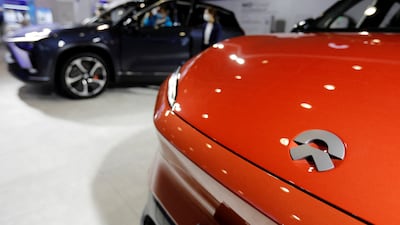For many years, China’s electric vehicle market was primarily driven by policy. The combination of fuel economy regulations, a new energy vehicle quota system, government fleet mandates and direct purchase subsidies, all added regulatory pressure and incentives for both car makers and consumers to go electric.
The policies still matter, but recent BloombergNEF analysis shows EV adoption is now running well ahead of what is required purely from national regulations and policy targets.
City-level policies are still playing an important role because they make it difficult to obtain a new licence plate for internal combustion vehicles in China’s major cities. However, even that is not enough to explain why adoption is rising so quickly.
There are many factors at play when a consumer technology starts to take off. Technology maturity, cost competitiveness and word of mouth all play a role. In China’s EV market, there is another factor at play, namely that homegrown EV start-ups have helped to transform perceptions of the vehicles there.
There was talk a few years ago about how many of these start-ups risked being wiped out by stricter technology standards. Instead, some not only survived, but are also growing sales quite quickly.
Xpeng, Hozon New Energy Automobile, Li Auto, Nio, Leap Motor and WM Motor are now selling almost 150,000 EVs a quarter, about 7 per cent of the global total and up more than 10-fold from the beginning of 2020.
These start-ups are less likely to be designing vehicles strictly to comply with regulations, as some Western, Japanese and Chinese car makers with legacy businesses have done.
They have no legacy business to protect, know subsidies will not last for ever and that their products need to stand on their own feet quickly.
China’s EV start-ups also have made a combined push on digital services, in-car connectivity and customer-service experience concurrently with their electrification efforts. These have helped to shift the perception of EVs from one of compliance and regulation to one where you access the coolest tech, and are treated well in the process.
They are not alone, of course. Other dynamic car companies are pursuing a similar strategy, and the start-ups’ share of sales is still relatively small compared with the likes of Tesla and BYD, which sold 255,000 and 354,000 plug-in vehicles globally last quarter, respectively.
But the start-up numbers are still significant. They are ramping up quickly and will probably top 250,000 a quarter next year.
The group getting squeezed by all this is established global car makers, many of which deliberately slow-rolled their EV programmes and are now scrambling to catch up with respect to their model line-ups and battery supply.
As recently as 2020, international car makers had 61 per cent of the total car market in China. That has declined to 49 per cent so far in 2022. Setbacks on software and disputes with local partners are not helping, and with China’s EV sales rising fast, it is becoming harder to see this market share trend reversing.
While western car makers are seeing their share of the Chinese market shrink, China’s EV start-ups are quickly expanding in Europe.
MG Motor, owned by SAIC, sold 40,000 EVs in Europe last year, while groups like Nio, Xpeng, BYD and others have been testing the waters with smaller numbers in countries such as Norway.
All of China’s start-up car makers plan to significantly increase their international presence in the next few years and some of them are launching very cost-competitive EV models to further that goal.
There is a window open for them in Europe right now, because the region’s vehicle carbon dioxide regulations do not tighten again until 2025.
Many established car makers have slowed down their EV roll-out accordingly.
With Tesla, BYD and these EV start-ups all at the gate, this may not be a wise strategy.

